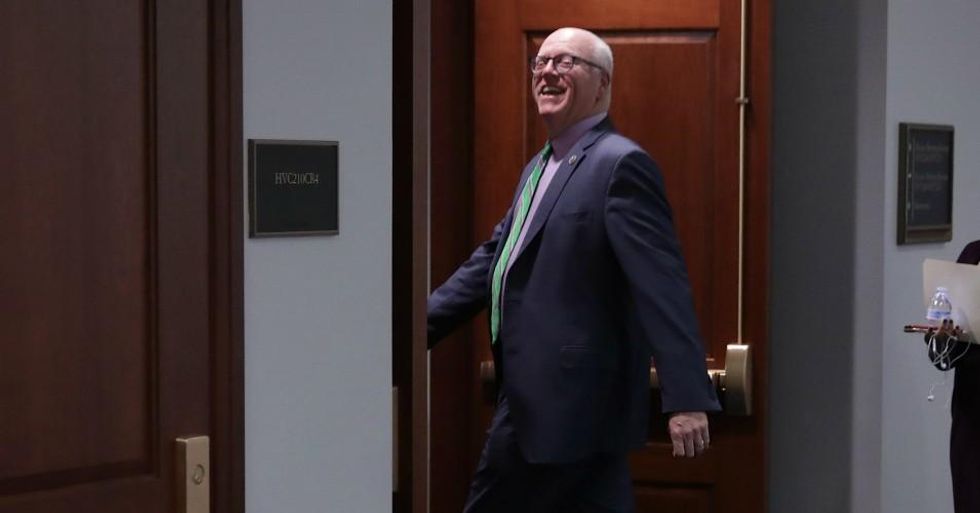
Rep. Alexandria Ocasio-Cortez (D-NY) and Sen. Ted Cruz (R-Texas) make strange bedfellows as they both agree that the revolving door between Capitol Hill offices and the corporate lobbyist suites of K Street should be permanently closed. (Photo collage: Mario Tama/Getty Images / AP)
Ocasio-Cortez and Ted Cruz Agree: The Revolving Door Between Congress and Washington's Lobby Industry Has Got to Go
No lawmaker should be cashing in on their public service and selling their contacts and expertise to the highest bidder
Who would have thought that Ted Cruz and Alexandria Ocasio-Cortez would be in harmony about anything?
But the progressive House freshman from New York and the conservative senator from Texas do agree that there's something seriously wrong with the revolving door between Congress and Washington's lobbying industry.
"Retired or defeated lawmakers should not serve as chaperones for corporate interests who are trying to write federal policy in their favor."
Cruz and Ocasio-Cortez got into a surprisingly friendly chat on social media yesterday after we at Public Citizen released a report documenting the stark reality that nearly two-thirds of recently retired or defeated U.S. lawmakers who are no longer in government or politics have landed jobs influencing federal policy.
Some examples:
- Former U.S. Rep. Joe Crowley (D-N.Y.), defeated by Ocasio-Cortez, now works for lobbying giant Squire Patton Boggs
- Former U.S. Rep. Lamar Smith (R-Texas), now works for lobbying firm Akin Gump, where he is registered to lobby in favor of the same controversial copper and gold mine in Alaska that he pushed for while in Congress
- Former Rep. Lynn Jenkins (R-Kan.), launched her own lobbying firm before she even left Congress
- Former Sen. Jon Kyl (R-Ariz.) left his lobbying job at Covington & Burling to serve in the Senate for only four months after the death of Sen. John McCain. Kyl then returned to Covington with his Senate contacts refreshed
It's great to see that both Cruz and Ocasio-Cortez are appalled and think there should be a complete ban on former members of Congress becoming lobbyists. This a position shared by a bipartisan group of lawmakers including Sens. Michael Bennet (D-Colo.) and Cory Gardner (R-Colo.) Sens. Mike Braun (R-Ind.) and Rick Scott (R-Fla.) and Sen. Elizabeth Warren (D-Mass.).
Better still, after Ocasio-Cortez and Cruz's unexpected breakout of comity, Sen. Brian Schatz (D-Hawaii) and Rep. Chip Roy (R-Tex.), former chief of staff for Cruz, also chimed in with support.
By going through Washington's "revolving door," lawmakers are effectively trading in on their relationships and knowledge to help companies profit and to enrich themselves - a pattern that has been in place for many years.

Currently, federal ethics laws provide minimal protections against influence-peddling by former members of Congress. Former members of the House of Representatives are barred from making lobbying contacts with their ex-colleagues for one year. A two-year ban applies to former Senate lawmakers.
However, loopholes in the ethics laws diminish the impact of these modest "cooling off" periods. For example, former lawmakers can immediately turn around and lobby executive agencies such as the Environmental Protection Agency, the Interior Department, the Federal Trade Commission or the Food and Drug Administration so long as they do not lobby Congress.
"The unexpected agreement between of left and right exposes a fundamental truth about our politics: Americans of all political stripes have a healthy distrust for concentrated power and want fundamental and far-reaching reforms to our corrupt political system."
Former lawmakers are also able to brand themselves as "strategic consultants" who advise registered lobbyists on strategies for approaching lawmakers, but do not make lobbying contacts with lawmakers themselves.
Nicknamed the Daschle loophole--after former Sen. Tom Daschle (D-S.D.) who worked for several major Washington, D.C., law and lobbying firms for more than a decade but did not register as a lobbyist until 2016--this dodge is a common way to meet the technical requirements of the law while ignoring the law's intended purpose.
In 2013, after leaving the Senate to join Covington & Burling for the first time, John Kyl told the Washington Post that there is a "a huge amount of work that can be done" legally even while restricted by a two-year cooling off period. "I can provide my insights into the people and process on Capitol Hill for them to take advantage of in the lobbying they do," Kyl said at the time.
If Congress wants to impose a lifetime ban on lobbying, that would be great. But at the very least, lawmakers can develop effective policies to rein in the most egregious revolving door abuses, such as much longer "cooling off" periods for former members of Congress and the Executive Branch, and end to loopholes that render lobbying regulations next to meaningless.
The For the People Act (H.R. 1), which passed the House of Representatives in March, enacts sweeping reforms that would raise ethics standards at all levels of government. Importantly, H.R. 1 would define "strategic consulting" as lobbying for former members of Congress, subjecting this activity to the existing revolving door restrictions.
The legislation would also bar former executive branch officials from engaging in "strategic consulting" on behalf of a lobbying campaign as well as making direct lobbying contacts for two years after leaving government service.
No lawmaker should be cashing in on their public service and selling their contacts and expertise to the highest bidder. Retired or defeated lawmakers should not serve as chaperones for corporate interests who are trying to write federal policy in their favor.
The unexpected agreement between of left and right exposes a fundamental truth about our politics: Americans of all political stripes have a healthy distrust for concentrated power and want fundamental and far-reaching reforms to our corrupt political system.
An Urgent Message From Our Co-Founder
Dear Common Dreams reader, The U.S. is on a fast track to authoritarianism like nothing I've ever seen. Meanwhile, corporate news outlets are utterly capitulating to Trump, twisting their coverage to avoid drawing his ire while lining up to stuff cash in his pockets. That's why I believe that Common Dreams is doing the best and most consequential reporting that we've ever done. Our small but mighty team is a progressive reporting powerhouse, covering the news every day that the corporate media never will. Our mission has always been simple: To inform. To inspire. And to ignite change for the common good. Now here's the key piece that I want all our readers to understand: None of this would be possible without your financial support. That's not just some fundraising cliche. It's the absolute and literal truth. We don't accept corporate advertising and never will. We don't have a paywall because we don't think people should be blocked from critical news based on their ability to pay. Everything we do is funded by the donations of readers like you. Will you donate now to help power the nonprofit, independent reporting of Common Dreams? Thank you for being a vital member of our community. Together, we can keep independent journalism alive when it’s needed most. - Craig Brown, Co-founder |
Who would have thought that Ted Cruz and Alexandria Ocasio-Cortez would be in harmony about anything?
But the progressive House freshman from New York and the conservative senator from Texas do agree that there's something seriously wrong with the revolving door between Congress and Washington's lobbying industry.
"Retired or defeated lawmakers should not serve as chaperones for corporate interests who are trying to write federal policy in their favor."
Cruz and Ocasio-Cortez got into a surprisingly friendly chat on social media yesterday after we at Public Citizen released a report documenting the stark reality that nearly two-thirds of recently retired or defeated U.S. lawmakers who are no longer in government or politics have landed jobs influencing federal policy.
Some examples:
- Former U.S. Rep. Joe Crowley (D-N.Y.), defeated by Ocasio-Cortez, now works for lobbying giant Squire Patton Boggs
- Former U.S. Rep. Lamar Smith (R-Texas), now works for lobbying firm Akin Gump, where he is registered to lobby in favor of the same controversial copper and gold mine in Alaska that he pushed for while in Congress
- Former Rep. Lynn Jenkins (R-Kan.), launched her own lobbying firm before she even left Congress
- Former Sen. Jon Kyl (R-Ariz.) left his lobbying job at Covington & Burling to serve in the Senate for only four months after the death of Sen. John McCain. Kyl then returned to Covington with his Senate contacts refreshed
It's great to see that both Cruz and Ocasio-Cortez are appalled and think there should be a complete ban on former members of Congress becoming lobbyists. This a position shared by a bipartisan group of lawmakers including Sens. Michael Bennet (D-Colo.) and Cory Gardner (R-Colo.) Sens. Mike Braun (R-Ind.) and Rick Scott (R-Fla.) and Sen. Elizabeth Warren (D-Mass.).
Better still, after Ocasio-Cortez and Cruz's unexpected breakout of comity, Sen. Brian Schatz (D-Hawaii) and Rep. Chip Roy (R-Tex.), former chief of staff for Cruz, also chimed in with support.
By going through Washington's "revolving door," lawmakers are effectively trading in on their relationships and knowledge to help companies profit and to enrich themselves - a pattern that has been in place for many years.

Currently, federal ethics laws provide minimal protections against influence-peddling by former members of Congress. Former members of the House of Representatives are barred from making lobbying contacts with their ex-colleagues for one year. A two-year ban applies to former Senate lawmakers.
However, loopholes in the ethics laws diminish the impact of these modest "cooling off" periods. For example, former lawmakers can immediately turn around and lobby executive agencies such as the Environmental Protection Agency, the Interior Department, the Federal Trade Commission or the Food and Drug Administration so long as they do not lobby Congress.
"The unexpected agreement between of left and right exposes a fundamental truth about our politics: Americans of all political stripes have a healthy distrust for concentrated power and want fundamental and far-reaching reforms to our corrupt political system."
Former lawmakers are also able to brand themselves as "strategic consultants" who advise registered lobbyists on strategies for approaching lawmakers, but do not make lobbying contacts with lawmakers themselves.
Nicknamed the Daschle loophole--after former Sen. Tom Daschle (D-S.D.) who worked for several major Washington, D.C., law and lobbying firms for more than a decade but did not register as a lobbyist until 2016--this dodge is a common way to meet the technical requirements of the law while ignoring the law's intended purpose.
In 2013, after leaving the Senate to join Covington & Burling for the first time, John Kyl told the Washington Post that there is a "a huge amount of work that can be done" legally even while restricted by a two-year cooling off period. "I can provide my insights into the people and process on Capitol Hill for them to take advantage of in the lobbying they do," Kyl said at the time.
If Congress wants to impose a lifetime ban on lobbying, that would be great. But at the very least, lawmakers can develop effective policies to rein in the most egregious revolving door abuses, such as much longer "cooling off" periods for former members of Congress and the Executive Branch, and end to loopholes that render lobbying regulations next to meaningless.
The For the People Act (H.R. 1), which passed the House of Representatives in March, enacts sweeping reforms that would raise ethics standards at all levels of government. Importantly, H.R. 1 would define "strategic consulting" as lobbying for former members of Congress, subjecting this activity to the existing revolving door restrictions.
The legislation would also bar former executive branch officials from engaging in "strategic consulting" on behalf of a lobbying campaign as well as making direct lobbying contacts for two years after leaving government service.
No lawmaker should be cashing in on their public service and selling their contacts and expertise to the highest bidder. Retired or defeated lawmakers should not serve as chaperones for corporate interests who are trying to write federal policy in their favor.
The unexpected agreement between of left and right exposes a fundamental truth about our politics: Americans of all political stripes have a healthy distrust for concentrated power and want fundamental and far-reaching reforms to our corrupt political system.
Who would have thought that Ted Cruz and Alexandria Ocasio-Cortez would be in harmony about anything?
But the progressive House freshman from New York and the conservative senator from Texas do agree that there's something seriously wrong with the revolving door between Congress and Washington's lobbying industry.
"Retired or defeated lawmakers should not serve as chaperones for corporate interests who are trying to write federal policy in their favor."
Cruz and Ocasio-Cortez got into a surprisingly friendly chat on social media yesterday after we at Public Citizen released a report documenting the stark reality that nearly two-thirds of recently retired or defeated U.S. lawmakers who are no longer in government or politics have landed jobs influencing federal policy.
Some examples:
- Former U.S. Rep. Joe Crowley (D-N.Y.), defeated by Ocasio-Cortez, now works for lobbying giant Squire Patton Boggs
- Former U.S. Rep. Lamar Smith (R-Texas), now works for lobbying firm Akin Gump, where he is registered to lobby in favor of the same controversial copper and gold mine in Alaska that he pushed for while in Congress
- Former Rep. Lynn Jenkins (R-Kan.), launched her own lobbying firm before she even left Congress
- Former Sen. Jon Kyl (R-Ariz.) left his lobbying job at Covington & Burling to serve in the Senate for only four months after the death of Sen. John McCain. Kyl then returned to Covington with his Senate contacts refreshed
It's great to see that both Cruz and Ocasio-Cortez are appalled and think there should be a complete ban on former members of Congress becoming lobbyists. This a position shared by a bipartisan group of lawmakers including Sens. Michael Bennet (D-Colo.) and Cory Gardner (R-Colo.) Sens. Mike Braun (R-Ind.) and Rick Scott (R-Fla.) and Sen. Elizabeth Warren (D-Mass.).
Better still, after Ocasio-Cortez and Cruz's unexpected breakout of comity, Sen. Brian Schatz (D-Hawaii) and Rep. Chip Roy (R-Tex.), former chief of staff for Cruz, also chimed in with support.
By going through Washington's "revolving door," lawmakers are effectively trading in on their relationships and knowledge to help companies profit and to enrich themselves - a pattern that has been in place for many years.

Currently, federal ethics laws provide minimal protections against influence-peddling by former members of Congress. Former members of the House of Representatives are barred from making lobbying contacts with their ex-colleagues for one year. A two-year ban applies to former Senate lawmakers.
However, loopholes in the ethics laws diminish the impact of these modest "cooling off" periods. For example, former lawmakers can immediately turn around and lobby executive agencies such as the Environmental Protection Agency, the Interior Department, the Federal Trade Commission or the Food and Drug Administration so long as they do not lobby Congress.
"The unexpected agreement between of left and right exposes a fundamental truth about our politics: Americans of all political stripes have a healthy distrust for concentrated power and want fundamental and far-reaching reforms to our corrupt political system."
Former lawmakers are also able to brand themselves as "strategic consultants" who advise registered lobbyists on strategies for approaching lawmakers, but do not make lobbying contacts with lawmakers themselves.
Nicknamed the Daschle loophole--after former Sen. Tom Daschle (D-S.D.) who worked for several major Washington, D.C., law and lobbying firms for more than a decade but did not register as a lobbyist until 2016--this dodge is a common way to meet the technical requirements of the law while ignoring the law's intended purpose.
In 2013, after leaving the Senate to join Covington & Burling for the first time, John Kyl told the Washington Post that there is a "a huge amount of work that can be done" legally even while restricted by a two-year cooling off period. "I can provide my insights into the people and process on Capitol Hill for them to take advantage of in the lobbying they do," Kyl said at the time.
If Congress wants to impose a lifetime ban on lobbying, that would be great. But at the very least, lawmakers can develop effective policies to rein in the most egregious revolving door abuses, such as much longer "cooling off" periods for former members of Congress and the Executive Branch, and end to loopholes that render lobbying regulations next to meaningless.
The For the People Act (H.R. 1), which passed the House of Representatives in March, enacts sweeping reforms that would raise ethics standards at all levels of government. Importantly, H.R. 1 would define "strategic consulting" as lobbying for former members of Congress, subjecting this activity to the existing revolving door restrictions.
The legislation would also bar former executive branch officials from engaging in "strategic consulting" on behalf of a lobbying campaign as well as making direct lobbying contacts for two years after leaving government service.
No lawmaker should be cashing in on their public service and selling their contacts and expertise to the highest bidder. Retired or defeated lawmakers should not serve as chaperones for corporate interests who are trying to write federal policy in their favor.
The unexpected agreement between of left and right exposes a fundamental truth about our politics: Americans of all political stripes have a healthy distrust for concentrated power and want fundamental and far-reaching reforms to our corrupt political system.

